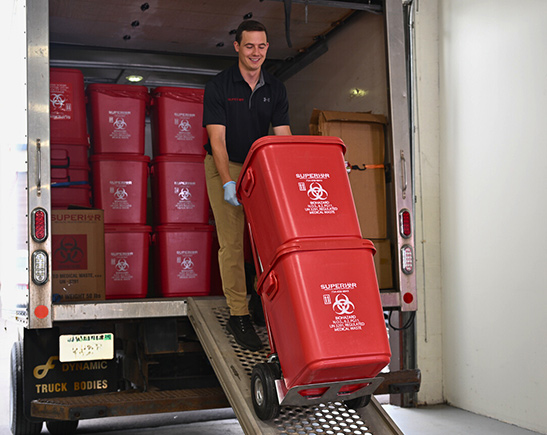Local Commitment: Your Community's Leading Medical Waste Removal Near Me
Local Commitment: Your Community's Leading Medical Waste Removal Near Me
Blog Article
Exploring Different Waste Disposal Options for a Cleaner Atmosphere
In the search of a cleaner setting, the monitoring of garbage disposal has become an essential prime focus for lasting development. With a wide range of garbage disposal alternatives readily available, varying from typical land fill approaches to ingenious waste-to-energy modern technologies, the choice of how we handle our waste has far-ranging implications for our planet's well-being. By analyzing the different approaches and strategies utilized in reusing, composting, incineration, garbage dump management, and waste-to-energy processes, a deeper understanding of their influences and performance can be gotten. The mission for optimal garbage disposal methods that focus on ecological conservation while fulfilling the demands of a growing population continues to be a pushing worry in today's world.
Recycling Approaches
Implementing efficient reusing methods is essential in lessening waste and advertising sustainability in our environment. Recycling involves the procedure of transforming waste materials into multiple-use things to prevent unneeded disposal.
An additional essential recycling technique is composting, which includes disintegrating organic waste like food scraps and lawn trimmings into nutrient-rich soil. By incorporating these various reusing techniques into our waste monitoring techniques, we can dramatically decrease our environmental impact and relocate in the direction of a much more sustainable future.

Composting Strategies
Efficient waste management practices, such as recycling approaches, pave the means for a cleaner atmosphere, and now, moving the focus to 'Composting Techniques', we check out lasting ways to decay organic waste for environmental advantage. medical waste removal near me.
Composting is an all-natural process that transforms natural waste, like food scraps and lawn trimmings, right into a nutrient-rich dirt modification. The trick to effective composting hinges on producing the appropriate equilibrium of green products, such as fruit and veggie scraps, and brown materials, like dried leaves and branches. These products decompose with the help of bacteria, damaging down the waste right into valuable compost.
Standard backyard composting includes layering organic materials in a bin or stack and on a regular basis transforming the blend to aerate it. By utilizing composting techniques, we can reduce the quantity of waste sent out to landfills while creating a useful product for improving dirt and sustaining plant development.
Incineration Disadvantages and pros
Incineration, as a garbage disposal approach, provides both benefits and downsides that merit careful consideration in the world of sustainable waste administration practices. On the silver lining, incineration can dramatically minimize the volume of waste, decreasing the demand for landfill room and potentially lowering greenhouse gas emissions. Incineration likewise permits the recuperation of energy via the generation of electrical power or warm, contributing to source recovery. The process can be made use of to ruin unsafe substances, supplying a risk-free approach for dealing with certain kinds of waste that may position dangers to public health and wellness and the setting if left untreated.
However, there are significant downsides to incineration. One major issue is the possible launch of unsafe pollutants into the air, such as dioxins, heavy steels, and particle issue, which can have unfavorable impacts on human wellness and the setting. Additionally, the high initial investment and functional prices of incineration centers pose financial obstacles, making it a much less affordable choice compared to various other waste administration approaches. Mindful tracking and guideline are important to reduce these unfavorable effects and make the most of the advantages of incineration as component of a thorough waste monitoring approach.
Land Fill Administration Methods
Land fills play an essential function in waste administration and environmental preservation by offering a containment system for the disposal of solid waste products. Reliable garbage dump monitoring techniques are vital to minimize ecological influences and ensure the long-term sustainability of these garbage disposal websites. One vital approach is correct waste compaction to maximize the use of available space within the land fill (click here). By condensing the waste, the quantity is reduced, allowing for more waste to be suited over time.
Furthermore, the implementation of daily cover techniques is crucial in lessening odors, protecting against trash, and lowering the attraction of insects. Treatment the disposed waste at the end of daily assists to contain odors and protect against prospective environmental contamination. In addition, the tracking of land fill gas discharges and leachate degrees is vital in making sure that environmental criteria are fulfilled which any kind of prospective risks to bordering ecological communities are minimized.

Waste-to-Energy Technologies
One of the ingenious techniques to squander management involves utilizing Waste-to-Energy innovations to convert strong waste right into usable power sources. Waste-to-Energy (WtE) modern technologies encompass a range of processes that aim to draw out energy from waste materials through thermal, chemical, or biological ways. This conversion procedure not only lowers the quantity of waste that winds up in land fills yet also generates valuable power resources such as electrical energy, heat, or biofuels.
There are a number of methods of Waste-to-Energy conversion, including gasification, pyrolysis, and incineration. Incineration includes shedding waste at high temperatures to generate warmth and electricity. Gasification transforms waste right into a syngas, which can be used for power generation or chemical manufacturing. Pyrolysis breaks down natural materials making use of high temperature levels in the absence of oxygen, producing gas, bio-oil, and char.
Executing Waste-to-Energy innovations can aid minimize ecological issues linked with conventional garbage disposal methods while simultaneously giving a renewable resource resource. Nonetheless, cautious factor to consider has to be provided to exhausts control and making sure the sustainability of feedstock supplies published here for these modern technologies to be genuinely useful for a cleaner setting.
.jpg)
Final Thought
Finally, discovering numerous garbage disposal options such as reusing, composting, incineration, landfill management, and waste-to-energy innovations is essential for promoting a cleaner setting - click here. Each approach has its own advantages and obstacles, yet by utilizing a mix of these techniques, we can function in the direction of decreasing the amount of waste that winds up in land fills and ultimately add to a more sustainable future for generations ahead
With a multitude of waste disposal choices offered, varying from typical landfill methods to innovative waste-to-energy innovations, the option of just how we manage our waste has significant effects for our planet's wellness. medical waste disposal.Incineration, as a waste disposal approach, presents both advantages and downsides that warrant cautious consideration in the realm of lasting waste monitoring techniques.Garbage dumps play an important function in waste management and environmental conservation by providing a containment system for the disposal of solid waste materials. By compacting the waste, the quantity is lowered, permitting for more waste to be accommodated over time
One of the ingenious approaches to squander management includes taking advantage of Waste-to-Energy modern technologies to transform solid waste into usable power resources.
Report this page